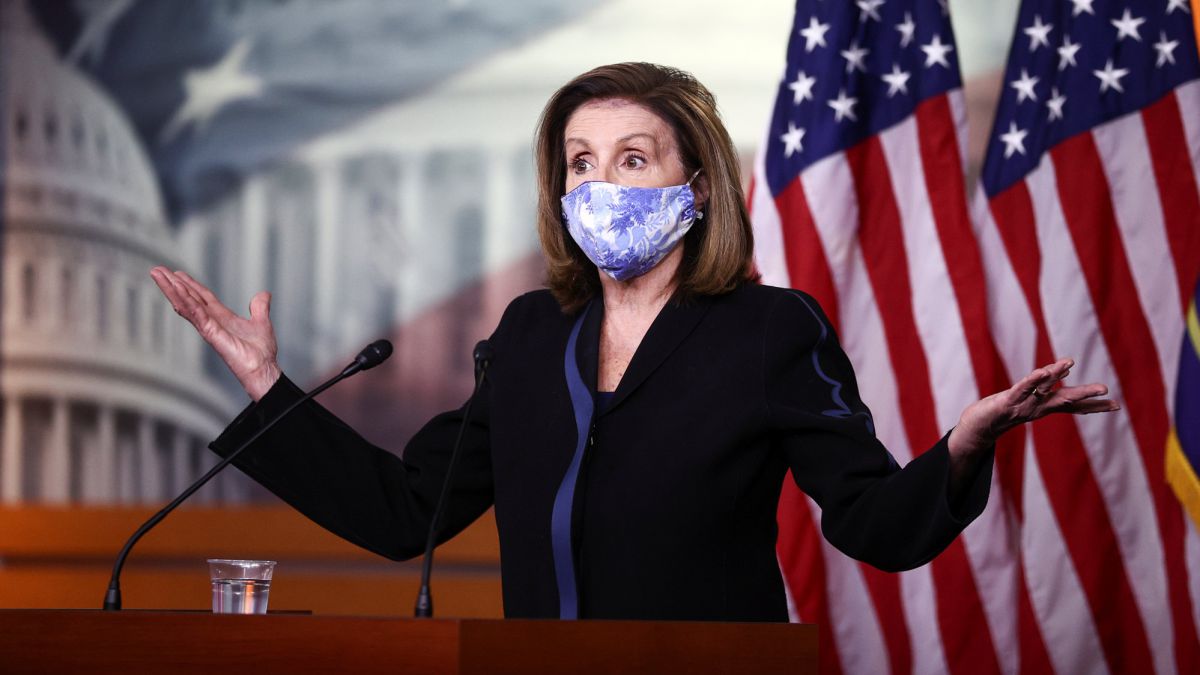
Donald Trump’s final weeks as president before Joe Biden takes the reins in January look set to be rather busy. One major task he has pending is to sign into law a new stimulus bill, building on economic pandemic relief passed by Congress in March, the CARES Act. The second one, which could end up being based on the $2.2 trillion HEROES Act passed in the House back in October, is coming up against major roadblocks as the core beliefs of both parties on how to best manage economic recovery seem world’s apart.
The Democrat-controlled House of Representatives with Nancy Pelosi as Speaker continues to negotiate with the Senate, which is in the hands of the Republicans, with Mitch McConnell at the helm. (It's worth noting that the upper chamber could change hands in January).
Both sides say they are keen to get something passed as soon as possible, but the crucial sticking point seems to be a gulf between the maximum amount each is willing to spend on economic relief owing to covid-19.
Congress must now do a Covid Relief Bill. Needs Democrats support. Make it big and focused. Get it done!
— Donald J. Trump (@realDonaldTrump) November 14, 2020
“Right now, Congress should come together and pass a COVID relief package like the Heroes Act that the House passed six months ago.” —President-elect @JoeBiden
Trump and McConnell have blocked relief for six months as cases and deaths mount. pic.twitter.com/Ctfkq9mDic
— CAP Action (@CAPAction) November 16, 2020
Is a second stimulus check going to be in the bill?
It's frustratingly still hard to call. Another disparity that exists between Pelosi and McConnell is that Democrats largely support including a second stimulus check, or Economic Impact Payment, of $1,200 to eligible individuals in the bill, whereas McConnell insists that isn’t appropriate. While McConnell digs his heels in for a more “targeted” – translation: much smaller – bill, Pelosi has made noises that progress could still be made. And Senator Susan Collins of Maine has also indicated that she has a desire to see a bill passed that will help millions of Americans who are in desperate need of support.
In the interest of optimism, here’s our breakdown on what has to happen following the bill passing Congress, before you’d get your money.
What’s the timeline to deliver a stimulus check after it gets approved?
The good news is that if a bill does get passed and that bill has stimulus checks in it, the systems are already in place with the IRS that make the whole process run a lot quicker the second time round.
Back in August, Treasury Secretary Steven Mnuchin said it would take about a week to process the first payments. "I can get out 50 million payments really quickly. A lot of it into people's direct accounts," he promised. Of course, this doesn’t mean you'll definitely get yours a week after pen goes to paper in Congress, but there are some methods of payments that are slower than others; the fastest being direct deposit, then paper checks, then the slowest is “EIP”, Economic Impact Payment, cards.
The earliest possible scenario looks like this; if the president signs the bill into law on 13 December, the first direct deposits would be issues the week of 28 December. The first paper checks would be sent out the week of 11 January, and finally EIP cards the week of 8 February.
The next possible date for the president to sign a bill following mid-December would be 3 February. The direct deposits would come the week of 8 February, paper checks on 16 February and then the EIP cards trailing on 15 March.
Following those two scenarios, according to analysis done by Cnet, the next dates start in March and then April respectively, with checks trickling in right through April and May.
It’s important to note that the IRS doesn’t have capacity to send all checks at the same time, they’ve so far sent 160 million of them from the first stimulus bill, and some people are still waiting.
The IRS has said it can deliver five million to seven million paper stimulus checks a week, and that they will prioritise those most in need, so they’ll start with people whose adjusted gross income, or AGI is less than $20,000.
And here’s a handy stimulus calculator devised by Cnet that can help you figure out how much you could get.
"payment" - Google News
November 17, 2020 at 05:15AM
https://ift.tt/3f6Prr3
Stimulus check: how long will payment take after it's passed? - AS English
"payment" - Google News
https://ift.tt/3bV4HFe
https://ift.tt/2VYfp89
Bagikan Berita Ini















0 Response to "Stimulus check: how long will payment take after it's passed? - AS English"
Post a Comment